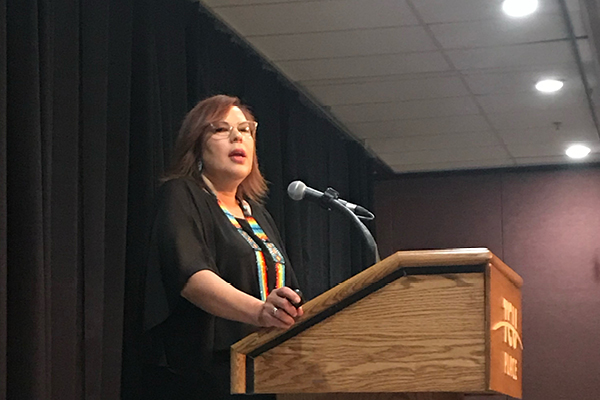
Advocating for future generations of Indigenous peoples in Saskatchewan
Marcia Mirasty, Masters of Northern Governance and Development (MNGD) graduate, is a proud member of Canoe Lake Cree First Nation in northern Saskatchewan who is passionate about helping Indigenous people step into their greatness.
By Emilie Neudorf, Marketing and Communications AssistantBenefiting Future Generations
Mirasty is a leader, workshop facilitator, motivational speaker, mental health therapist, and senior health director who has inspired both youth and Elders to “break cycles of dysfunction and move forward in a powerful way for the benefit of our future generations”. She incorporates her cultural values and beliefs into her work and believes that everyone deserves a second chance.
“I have always wanted to be a part of something greater than myself. I believe in positive transformational shifts happening with our Indigenous people. I have understood clearly in my undergrad studies and work experience that policy and governance is necessary to make progress and clear the path for change.”Building a Career
Completing her Master of Northern Governance and Development (MNGD) from the Johnson Shoyama Graduate School of Public Policy (JSGS) helped Mirasty further her career.
She has had an impressive career facilitating workshops, and public speaking for the Royal Commission of Aboriginal People, the Truth and Reconciliation Commission, Meadow Lake Tribal Council (MLTC) Residential School Conference, and MLTC/La Plonge Residential School Conference. “I have been fortunate to be able to share my story and skills at several conferences in the area of health and well-being.”
"This [MNGD] program has broadened my education background and made me more employable." Soon after graduating, Marcia found that her master’s degree from JSGS helped her to achieve her dream of becoming a mental health therapist, and it continues to benefit her career.
In the summer of 2020, Mirasty was hired as the Senior Health Director, Meadow Lake Tribal Council Health & Social Development. Mirasty will be able to use her professional and academic experiences in this important role.
As Senior Health Director, Mirasty has the opportunity to combine her passion for lifting up future generations of Indigenous Peoples in Saskatchewan with her knowledge surrounding policy and governance.
A New Perspective
Mirasty reflects that JSGS assisted her with being able to find new ways of looking at the needs of Indigenous people in Saskatchewan. This has helped her think of new ways to resolve issues in our province through policy, governance, advocacy, and awareness.
It is especially important to offer new steps forward at a time when “our Indigenous people have seen one of the greatest shifts happen with the National Truth and Reconciliation Commission and the 94 Calls to Action in Canada.”
She encourages others to look inwards when looking for ways to help future generations. “The best gift we can give to our children is when we heal ourselves”.
Advice to Future Students
"I would encourage students considering JSGS to take advantage of its programs because the staff and resource people understand Indigenous people in the far north, rural and First Nation, and urban realities. JSGS has a track record and proven history of assisting our Indigenous people."
Mirasty was originally enrolled in the International Centre for Northern Governance and Development through the University of Saskatchewan. When the program was transferred to JSGS, she was introduced to new JSGS Saskatoon staff and faculty. "It was a good transition to be taken under the wing of JSGS faculty and staff who were equally supportive and encouraging. "
To get the most out of the program, Mirasty advises students to reach out to their academic advisor, attend university events, conferences, and forums. “Change is scary and uncomfortable, but is good when you know that you want to try something new, push yourself and expand your area of influence. It is the best feeling to be in charge of your destiny.”

